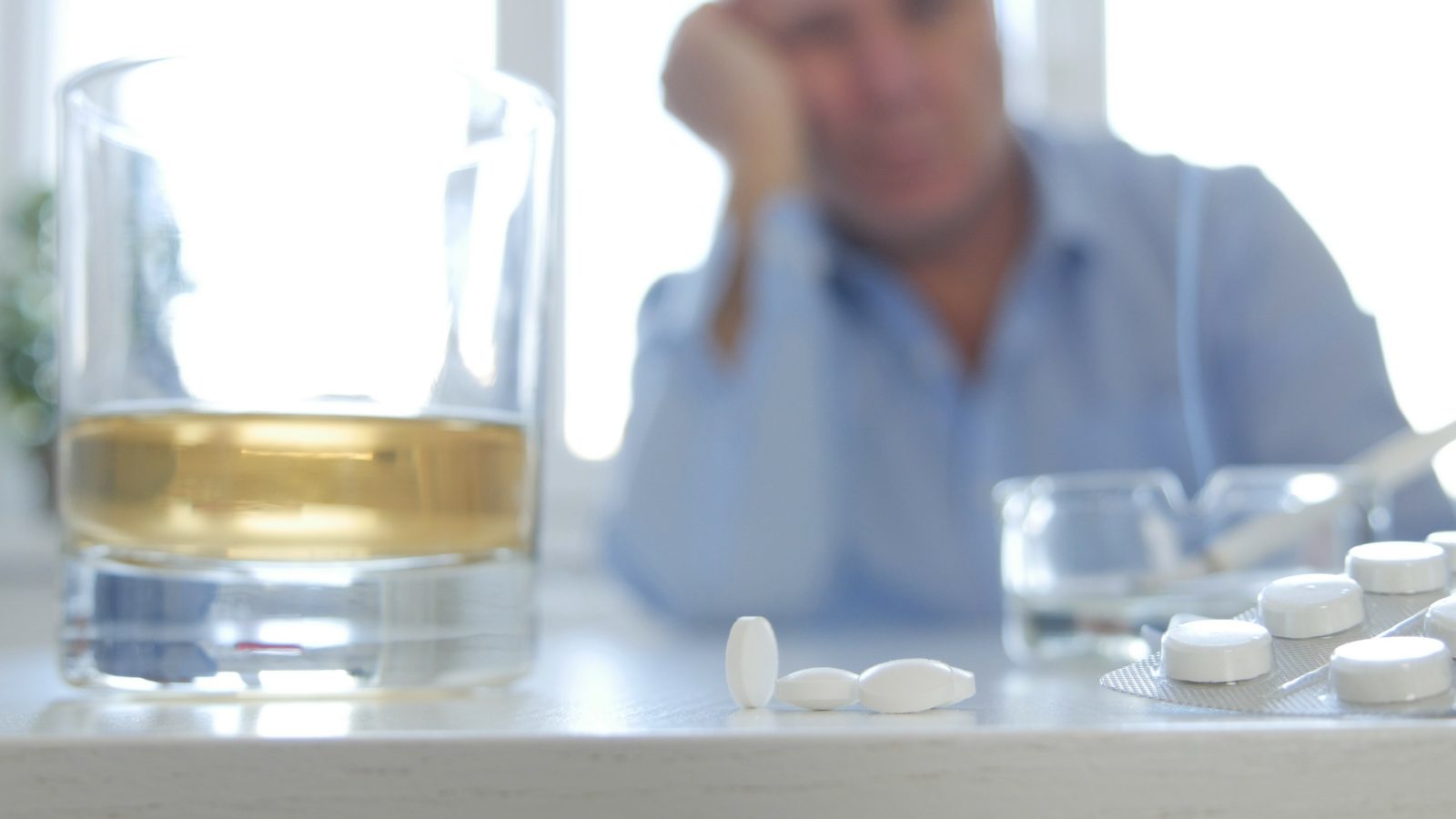While using pain relievers to prevent hangovers might seem appealing, it’s risky when combined with drinking. It’s no surprise that alcohol doesn’t mix well with many medications, given its impact on your brain and liver. But the combination of ibuprofen and alcohol might catch you off guard. Taking a couple of ibuprofen tablets is common practice for many to alleviate everyday pains and aches, even those associated with a hangover.
However, ibuprofen isn’t without its risks. Like any medication, it carries potential side effects, and combining it with alcohol can magnify those risks, especially if taken closely together. Notably, ibuprofen, acetaminophen, and aspirin all carry risks, particularly when mixed with alcohol. “All medications have inherent risks, but taking them with alcohol increases those risks,” warns Dr. Debra E. Brooks, an urgent care physician at GoHealth Urgent Care.
Even taking a pill right after a night out to preemptively treat an anticipated morning headache can be dangerous. Here’s why combining ibuprofen and alcohol is ill-advised and what experts suggest for pain relief before or after drinking.
Understanding How Ibuprofen Works
To begin, let’s explore how ibuprofen operates within your body.
Ibuprofen is categorized as a nonsteroidal anti-inflammatory drug (NSAID). Its purpose is to alleviate pain and, yes, to diminish inflammation.
The mechanism of ibuprofen involves blocking an enzyme known as cyclooxygenase (COX), which plays a pivotal role in your body’s response to inflammation. While this grants the medication its ability to alleviate discomfort, there’s a drawback: COX also supports kidney function, encourages blood platelet aggregation (when blood cells cluster to form crucial clots), and helps sustain the lining of your gastrointestinal (GI) tract.
Consequently, using ibuprofen regularly or for an extended duration can lead to stomach lining irritation, potentially causing ulcers and bleeding, harming kidney health, and affecting blood clotting, as stated by Dr. Brooks.
Why Avoid Mixing Alcohol and Ibuprofen?
So, what’s the reason behind refraining from consuming alcohol with ibuprofen?
Alcohol by itself is recognized as an irritant to the stomach lining. Excessive and frequent alcohol consumption is known to cause gastritis, leading to inflammation in the stomach lining. This, in turn, can set the stage for the emergence of stomach ulcers and bleeding. Additionally, alcohol can harm the kidneys and thin the blood. When ibuprofen is introduced into this equation, these effects can be intensified.
The potential repercussions for the gastrointestinal (GI) tract are of particular concern, as stated by Pooja Patel, PharmD, a clinical assistant professor at Texas A&M University’s Irma Lerma Rangel School of Pharmacy. Combining alcohol and nonsteroidal anti-inflammatory drugs (NSAIDs), like ibuprofen, elevates the risk of upper GI bleeding. Dr. Patel emphasizes that this outcome is particularly alarming since it can have fatal consequences. Kidney damage, on the other hand, tends to accumulate over time, whereas a GI bleed can unexpectedly turn into a medical emergency.
It’s important to note that the extent of alcohol consumption and the dose of ibuprofen taken influence the likelihood of GI bleeding. Dr. Patel clarifies that while it’s conceivable with any amount of alcohol, the risk is typically related to the dosage.
The more you drink or the higher the ibuprofen dosage, the greater the likelihood of bleeding. Dr. Patel adds that if you adhere to what’s considered moderate drinking—two standard drinks for men and one for women in a single session—the risk won’t be as significant as it would be with five or six drinks in one sitting, or if you drink daily.
Combining ibuprofen and alcohol puts anyone in danger, and the risk escalates further if you have specific health conditions or are on certain medications that heighten the chances of gastrointestinal (GI) bleeding. If, for instance, you have a background of stomach ulcers, have been using NSAIDs for an extended period to handle an inflammatory condition like rheumatoid arthritis, are taking blood thinners, or already have kidney damage, your susceptibility to bleeding increases significantly. In such cases, the combination of ibuprofen and alcohol becomes even more perilous, according to Dr. Patel.
Can you take aspirin or acetaminophen with alcohol instead?
Using aspirin along with alcohol comes with risks too. Aspirin, also an NSAID, acts as a blood thinner, making blood clotting harder. It’s sometimes recommended for those at risk of heart disease. Similar to ibuprofen, aspirin can impact the liver and kidneys and lead to GI tract bleeding. Dr. Brooks explains that alcohol enhances aspirin’s blood-thinning effects. People who drink heavily, already at risk due to stomach and liver damage, face even greater bleeding risks. So, it’s best to avoid mixing aspirin with alcohol.
On the other hand, acetaminophen works differently. It doesn’t affect blood clotting or harm the stomach lining. However, it can harm kidneys and is more toxic to the liver, raising the risk of liver failure compared to NSAIDs.
When drinking, your liver already handles a toxic substance and works hard to filter it. Adding acetaminophen strains the liver, heightening the damage risk. Yet, the concern mainly centers around frequent pairing over time. Dr. Patel notes, “For regular drinkers, acetaminophen might not be wise due to its liver impact.” If you’re not a heavy drinker and your liver’s healthy, taking acetaminophen occasionally after a drink or two is generally safer than an NSAID, as it doesn’t stress the stomach.
How long should you wait to drink after using ibuprofen?
“The timing varies based on the type and dosage,” explains Dr. Patel. Generally, you’d be safe to drink around two or three days after taking ibuprofen. If you used a rapid-release version, it could leave your system sooner, making it alright to drink a day or two later.
For taking a pain reliever the morning after drinking, the health risk hinges on many factors, like how much you drank and how much alcohol remains in your body.
“If you had one or two drinks, taking ibuprofen once is fine,” says Dr. Patel. (Remember, don’t make it a habit.) “If you had more than that, be cautious and wait at least a day,” especially if you have other GI bleeding risk factors.
In general, if you’re in good health without issues like gastritis, stomach ulcers, or kidney or liver problems, “taking any of these after having one drink during dinner is probably safe,” says Dr. Brooks. If you have a choice, the safest option is acetaminophen—although using it sparingly is wise. Eating food alongside alcohol seems to lessen its impact on the GI tract, potentially reducing side effects if you’re not drinking heavily.
If you must use pain relief while drinking or afterward, try to limit your alcohol consumption. If you’re taking pills to prevent a hangover the next morning, the best approach is the classic one: drink plenty of water and eat a substantial meal. Or simply drink responsibly to avoid a hangover altogether—your body will appreciate it.
















Find Us on Socials